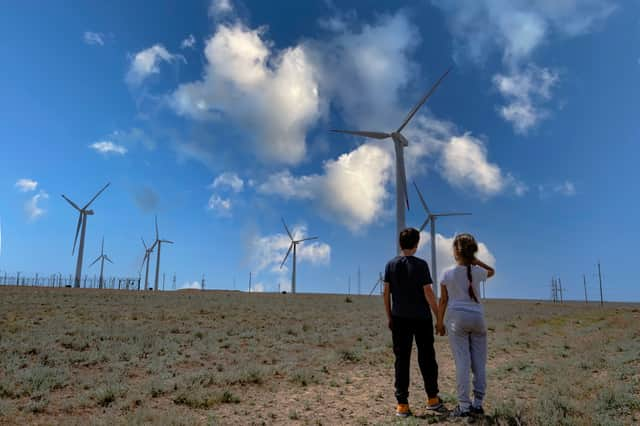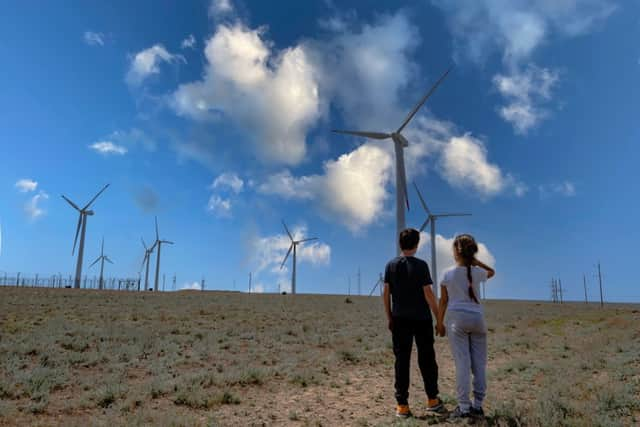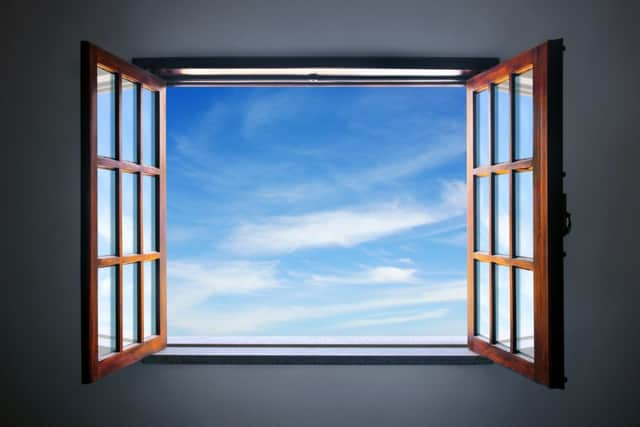Going Green - Alternative energy sources needed as gas prices increase


Latest article from Angela Terry
Green Green campaigner and consumer expert, Angela Terry, separates climate change facts from fiction and here she explains how you can take simple, practical steps to help save the planet. Follow @ouronehome & visit https://onehome.org.uk/ for more advice.
Q: Why don’t people like onshore wind farms?
A: They do! The truth is that 80 per cent of Brits support onshore wind, according to government research.


The Department for Business, Energy and Industrial Strategy’s official polling shows that support for renewable technologies is at an all-time high.
Here’s why the British public has got this right.
Energy crisis
Advertisement
Advertisement
New wind farms are needed now more than ever. The energy crisis is a gas crisis.
The quicker we switch to renewables, the quicker we can do something about our eye-watering bills. The price of wind has remained stable. It is our cheapest energy source, typically costing about a third of what people will soon be paying for electricity.
Rising gas prices
Surging gas prices affect gas and electricity bills because a significant share of the UK’s electricity is still produced by burning fossil fuels, mainly gas. The war in Ukraine has made gas prices even more volatile, especially as Vladimir Putin is largely funding his military aggression through gas sales. Prices won’t stabilise any time soon.
Rising bills
Our household bills are set to get even higher this October when the energy price cap – the maximum amount suppliers can charge for each unit of gas and electricity – will go up again. This will leave over 14 million people unable to pay their bills, according to Citizens Advice.
Planning
Advertisement
Advertisement
The UK Government hasn’t prioritised onshore wind in its plans for dealing with the energy crisis. Many energy experts had hoped the planning restrictions on onshore wind farms would come to an end. Despite their popularity and affordability, this has not happened.
Speed
Onshore wind farms are one of the quickest energy projects to get up and running. If planning restrictions were removed, any energy company could buy wind turbines and install them within months.
Around 600 wind farm and solar projects across the UK are being blocked. If they went ahead, they could provide enough clean energy to replace Britain’s consumption of Russian oil within 18 months.
Our own energy
Wind energy is British energy! More onshore wind turbines would make us more self-sufficient. Deriving energy from renewable sources is how we increase our energy security and stop our dependence on expensive fossil fuels from countries run by ruthless dictators.
Reliability
Advertisement
Advertisement
As an island positioned between the Atlantic and the North Sea, the UK has one of the best natural climates for wind farms. Of course, it’s not windy all the time. To ensure consistency and manage demand the green grid is increasingly powered by a mix of sources – like wind, solar and hydro.
Celebrity spot
Footballing legend David Beckham gave his son Brooklyn a $500k electric Jaguar as a wedding present when he married American actress Nicola Peltz.


The doting dad had a pale blue vintage XK120 Jaguar fully modernised and electrified by luxury classic car converter Lunaz.
The two-seater is open-topped and features a brand new cream interior.
Advertisement
Advertisement
Of course, Beckham senior may have had a discount, given that he invested in Lunaz last year. He has a 10 per cent stake in the Silverstone-based company.
Green swap
Swap air freshener for open window.


Research from University of York shows household aerosols release more harmful chemicals into atmosphere than all the vehicles in the country.
Letting in some fresh air is much better for you and your loved ones. And free!
How best we can avoid using single-use plastics
Plastic is everywhere.
It’s now even been found in human blood, in our lungs and in the placenta of unborn babies.
Advertisement
Advertisement
As we all know from watching David Attenborough documentaries, it takes a very long time to break down and then creates the dangerous microplastics that are getting inside our bodies.
The best thing we can do is try to avoid plastic.
Here are my tips ...
Fruit and veg
Whenever possible, opt for unpackaged fruit and veg.
Bring along your own bags to the supermarket.
You can buy reusable organic cotton produce bags on Etsy or you could just reuse old plastic bags.
Drinks
Try to avoid buying anything in a plastic bottle.
Take a reusable water bottle when you’re out and about.
Encourage kids to carry their school water bottles on the weekend.
Their teeth will benefit from a reduction in sugary drinks!
Lunch box
Takeaway sandwiches and salads are so convenient – but they’re packaged in plastic.
Advertisement
Advertisement
If you eat lunch at work, challenge yourself to see how often you can make your own.
You’ll save so much money too!
Refill
Refill old containers!
A growing number of refill shops are springing up, where you can refill bottles of things like washing up liquid, laundry detergent and fabric conditioner – as well as shower gels, shampoos and conditioners.
You can also take along food containers and fill them with store cupboard staples, like oats, rice and pasta.Supermarkets are getting in on the act too.
Morrisons, Waitrose, Ocado and Marks & Spencer recently joined a refillable grocery partnership.
Advertisement
Advertisement
By the end of the year, they plan to roll out both unpackaged options in-store and pre-filled mini bulk containers for home deliveries, which customers return when it’s their next delivery.
Coffee cup
Most takeaway coffee cups are lined with a plastic coating, to stop them leaking.
Each one contributes to the plastic problem, so try and invest in a reusable cup.
Once you get into the habit of taking it with you, it becomes the norm!
Clingfilm
Advertisement
Advertisement
More than 1.2 billion metres of cling film is used by British households every year.
See if you can manage without it by covering bowls of leftovers with a plate or storing them in Tupperware.
You could also invest in reusable beeswax wraps. Lakeland has a good selection. Online, you can try eco shop Peace with the Wild.
Fact or fiction
Palm oil is an environmental no-no.
Mostly true.
It’s a major cause of deforestation and looming extinction of orangutans.
Advertisement
Advertisement
However, you can buy biscuits and cleaning products containing ‘Fair Palm’ – sustainable palm oil, online from Traidcraft.
For previous articles visit:
Advertisement
Advertisement